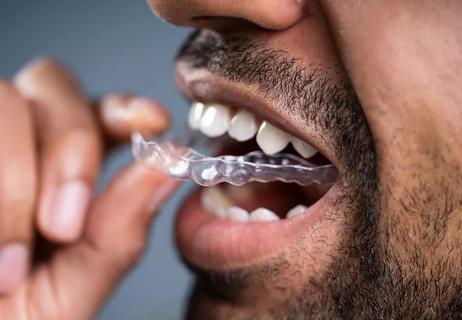From posture to massage, these 9 at-home remedies may help ease your jaw pain

Two of the most complex joints in your body are in your head and connect your lower jaw to your skull. These joints — known as the temporomandibular joints, or TMJ for short — also can be quite a pain.
Advertisement
Cleveland Clinic is a non-profit academic medical center. Advertising on our site helps support our mission. We do not endorse non-Cleveland Clinic products or services. Policy
It’s estimated that 5% to 12% of adults have some form of TMJ disorder. The jaw pain often comes on suddenly, too, and can mysteriously radiate and show up in other areas of your head and neck.
The good news? The condition is often temporary and may go away with some simple at-home treatments. Let’s find out what you can do from dentist Karyn Kahn, DDS.
To understand why your TMJ might hurt, it helps to understand how your jaw works.
“You have two temporomandibular joints that act like the closing of a door,” explains Dr. Kahn. “A door closes with two solid stable hinges, and so does the jaw as muscles close your lower jaw against your upper teeth. When the TMJ, muscles and teeth are in harmony with one another, there is less chance of jaw problems.”
The opening and closing happen constantly throughout the day as you’re talking or chewing. But rarely do your teeth come together.
If your teeth DO come in contact a lot … well, that’s when problems can start, says Dr. Kahn. Grinding or clenching your teeth stresses your TMJ. Over time, that takes a toll. Basically, TMJ pain often is an overuse injury.
Aside from jaw pain, signs of a TMJ issue may include:
Advertisement
Certain medications, alcohol use, smoking and stress can increase your chances of TMJ issues. Grinding and clenching may also run in families.
Video content: This video is available to watch online.
View video online (https://cdnapisec.kaltura.com/p/2207941/sp/220794100/playManifest/entryId/1_pebey26h/flavorId/1_5f3sgelj/format/url/protocol/https/a.mp4)
Clearly, TMJ tenderness isn’t something that anyone wants lingering. Thankfully, there are some simple things you can do at home to help relieve TMJ symptoms.
Dr. Kahn offers these nine tips.
Hot and cold? You bet. Each can help in a different way.
Let’s start on the chilly side of things. “Cold has a numbing effect,” explains Dr. Kahn. “So, if you have a sudden onset of sharp pain in your jaw, indicating there might be inflammation, the cold will help numb the joint and reduce the swelling.”
But if the pain persists for more than two or three days, it’s time to change the approach and heat things up. A warm, moist compress can help ease chronic TMJ pain. “I would recommend using moist heat compresses at least four times a day,” she says.
Massaging your aching jaw muscles can help release tension in a myofascial trigger point and help bring on “neuromuscular harmony” between the joint, tooth contact and muscles, notes Dr. Kahn.
Pro tip: Combining the massage with the warm compress can work wonders.
Think of how good your muscles feel after a stretching session. Why would it be any different for the muscles in your jaw? Try this:
The stretch can be done four to six times a day. “That will help stretch some tight muscles in your jaw and relieve pain-causing contraction of the muscle,” explains Dr. Kahn.
Poor posture can lead to all sorts of aches and pains — including in your jaw.
Hunching or slouching creates a body misalignment, primarily as your neck bends and your head dips down. This position can cause your jaw to jut forward and put stress on your TMJ. (Researchers have found a connection between posture and TMJ disorders.)
The solution? Sit up straight, for starters, especially if you have a desk job. (A chiropractor offers tips to improve your posture.)
Good posture isn’t just for when you’re awake. Sleeping on your back is the best position to keep your head, neck and jaw in their natural alignment and reduce strain on your TMJ.
But if you have or suspect that you have obstructive sleep apnea (OSA), sleeping on your back may not be the best choice. The position forces your jaw to fall back, which can make your airway smaller and snoring worse.
Advertisement
Your day takes a turn for the worse and you can feel the tension creep into your shoulders, neck and jaw. It’s not long before you’re clenching your jaw, grinding your teeth and irritating your TMJ.
Consider listening to soothing music or trying some relaxing breathing techniques to bring on a sense of calm, suggests Dr. Kahn. Put away that computer or smartphone before bed, too.
If your TMJ is hurting, chomping on chewy or crunchy food is a sure way to aggravate the joint even more. Take a temporary break from menu items such as:
Chewing on gum puts excess force on your TMJ muscles with side-to-side movement. That repetitive gnashing can lead to imbalance, misalignment and added stress while pulling on your TMJ.
Dr. Kahn recommends limiting gum chewing in general and discontinuing it if you have persistent jaw issues.
The anti-inflammatory magic that makes ibuprofen a widely used pain reliever can help when your TMJ or jaw muscles are sore. “It should only be used short-term for a week or two,” cautions Dr. Kahn. Look to make a dental appointment if pain persists beyond that time.
Advertisement
If the tips and tricks explained above don’t bring relief to your aching jaw within a few months, schedule a visit to your dentist or healthcare provider. (Make the call earlier if your jaw pain is accompanied by headaches, migraines or dizziness.)
A solution may be as simple as fitting you for a “night guard” to reduce the damaging effect of grinding or clenching your teeth as you sleep. These habits are a common source of TMJ issues and are difficult to stop, given that you’re asleep when it happens.
Your doctor also may prescribe physical therapy for jaw and neck muscles, short-term muscle relaxers or analgesics, or Botox® (botulinum toxin) injections to help ease nagging muscle contractions.
“An early diagnosis can help prevent something from becoming a chronic pain situation,” states Dr. Kahn.
Advertisement
Learn more about our editorial process.
Advertisement

Take a hands-on approach to release tension and reduce pain in your jaw muscles

Although Botox isn’t an FDA-approved treatment for TMD pain, it’s still considered a good supplemental therapy in some cases

TMJ pain can cause headaches, but chiropractic treatments, lifestyle adjustments and medication can help ease discomfort

The soreness could be from the way you sleep, teeth grinding, bite misalignment or other issues

You might think it’s fine, but your teeth and jaw beg to differ

If you have discomfort and pain in your face, it could mean something serious is going on

An expert gives us the details

A correct prescription helps your eyes see clearly — but as natural changes occur, you may need stronger or different eyeglasses

Wearing a scarf, adjusting your outdoor activities and following your asthma treatment plan can help limit breathing problems

Your diet in the weeks, days and hours ahead of your race can power you to the finish line

When someone guilt trips you, they’re using emotionally manipulative behavior to try to get you to act a certain way